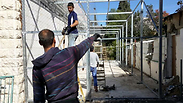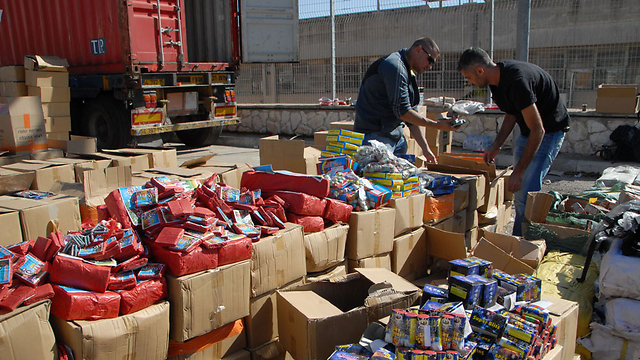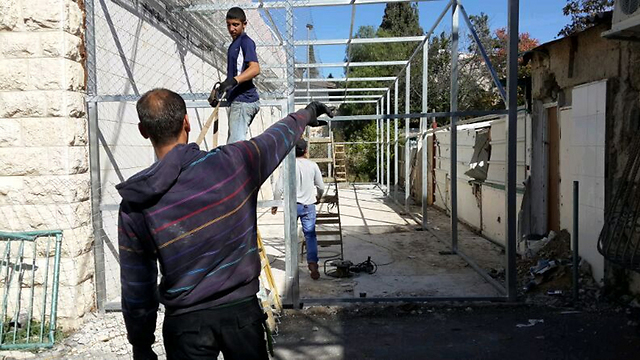
Palestinian workers fear for their jobs in Israel
'Many Palestinians say they’re afraid to go to work, and afraid that they will be attacked,' says al-Quds University professor.
Jafar Al-Halabi has worked at the Mishor Adumim branch of the Israeli discount supermarket chain Rami Levy for ten years. About 15 miles east of Jerusalem, Mishor Adumim is an industrial area in land that Israel captured in 1967. Israelis and Palestinians work together in the store, and shop together as well.
“I have Jewish friends – we work together and we eat together (on breaks),” Al-Halabi, 43, told The Media Line. “We try not to talk politics. It’s better that way because everyone has his own ideas.”
After two Palestinians armed with guns and meat cleavers murdered five Israelis in a Jerusalem synagogue this week, a nearby branch of Rami Levy sent its Palestinian workers home for the day, fearing revenge attacks by extremist Jews. That in turn set off a wave of speculation in social media that Rami Levy intended to fire more than 1,000 Palestinian workers.
“There is no intention to fire any of our workers,” a spokeswoman for Rami Levy told The Media Line.
The rumor was fueled by a decision by the mayor of the southern city of Ashkelon Itamar Shimoni to suspend construction work, which is done almost exclusively by Israeli-Arabs, near kindergartens attended by Jewish children. Many nursery schools throughout the country stationed security guards at the gates.
Prime Minister Binyamin Netanyahu reacted angrily to Shimoni’s order to suspend Arab workers saying “there is no room for discrimination against Israel’s Arabs.”
Netanyahu was talking about Arab citizens of Israel, who comprise 20 percent of Israel’s population. But in Jerusalem, where almost 300,000 Palestinians, most of whom are not citizens of Israel, live, the situation is more complicated. It was two Palestinian cousins from the East Jerusalem neighborhood of Jabal Mukaber who committed the murders in the Jerusalem synagogue.
Palestinians in East Jerusalem have the same blue identification cards as Jewish Israelis who live in the city, although only a few thousand are Israeli citizens. They pay taxes, and get Israeli health care. But for the past few weeks, there have been daily clashes between Israeli police in Jerusalem, and Palestinian demonstrators, who often throw firecrackers at police.
A police spokesman said they intercepted a large shipment of tens of thousands of firecrackers, as well as knives, tasers and other weapons that was on its way to East Jerusalem. The shipment came from China, and was addressed to Palestinian residents of the city.

The clashes intensified after a Palestinian bus driver was found hanging. While Israel says it is clearly suicide, Palestinians said they believed the man was murdered. Even after the Palestinian coroner said he agreed with his Israeli colleague, the rumors persisted. Dozens of Palestinian bus drivers staged a partial strike this week, sparking calls by Jerusalem city officials for them to be fired.
Some Palestinians in East Jerusalem said they stayed home because they are afraid of reprisal attacks by extremist Jews. They point to the events of the past summer, when extremist Jews burned a Palestinian teenager, Mohammed Abu Khdeir to death, after the bodies of three kidnapped Israeli teenagers murdered by a Palestinian were found.
“There is an atmosphere of hatred and fear, and many Palestinians here in Jerusalem are afraid,” Mahmoud Muhareb, a professor of political science at al-Quds University, who lives in Shuafat in East Jerusalem told The Media Line. “Many Palestinians say they’re afraid to go to work, and afraid that they will be attacked.”
He says the killing of Mohammed Abu Khdeir also sparked anger in many Palestinians in East Jerusalem.
“They are no longer willing to accept the status quo and want to fight for their rights for Jerusalem as the capital of Palestine,” he said. Israel annexed East Jerusalem in 1967 and says the whole city is the capital of the Jewish state.
Many Palestinians from East Jerusalem say there are few jobs available in their neighborhoods and they therefore work in Jewish-owned businesses. Mohamed Abu Malkhia from the East Jerusalem neighborhood of Beit Hanina, currently works for an Arab bus company. But for ten years, he said he worked in the Kings Hotel in downtown Jerusalem in maintenance.
“We all have responsibilities and children and all we want to do is live in peace and quiet,” the father of two young children told The Media Line. “God gives us work, and we all want to work.”
He said he left the hotel business because they cut his hours, not because he had any problem. But many Palestinians who work in Jerusalem say they worry that if the tensions persist, they could lose their jobs.
Article written by Linda Gradstein
Abdullah H. Erakat contributed reporting.
Reprinted with permission from The Media Line











